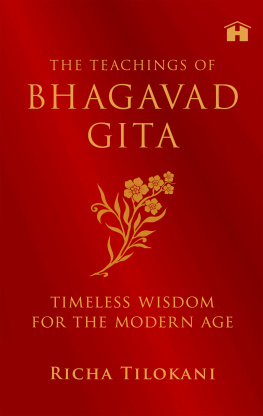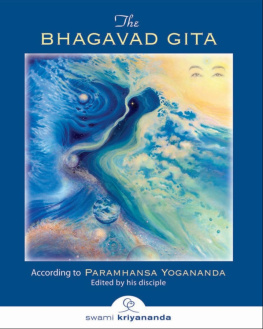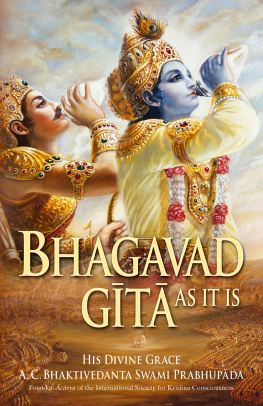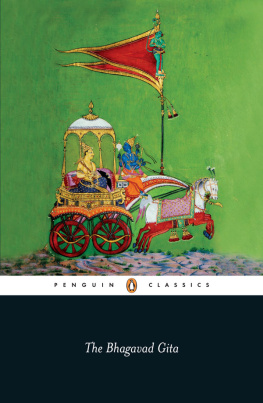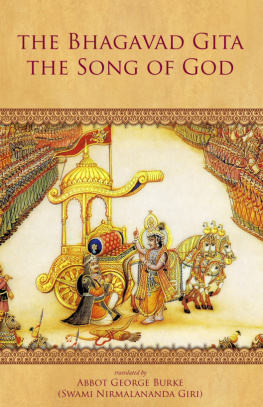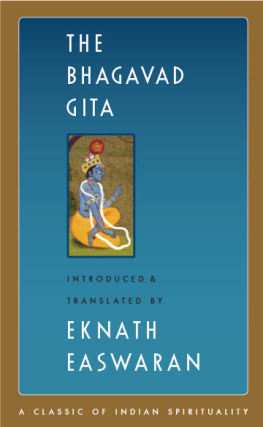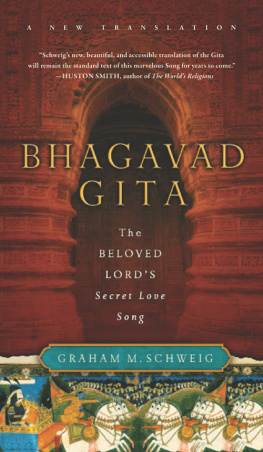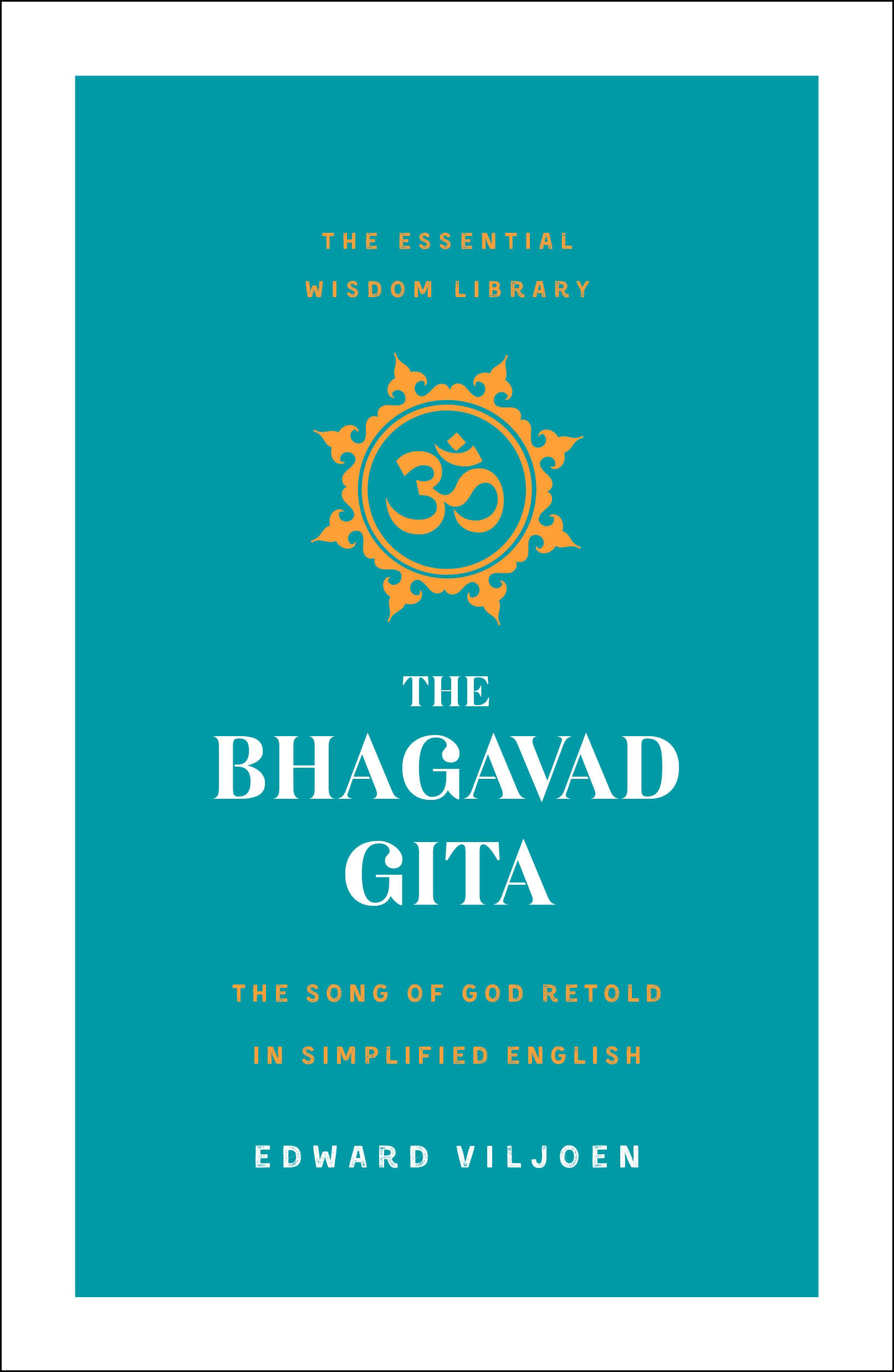English has complicated spelling and pronunciation rules with many exceptions, making it difficult to predict how a word should be written or said. This is not the case in Sanskrit, the language of the Bhagavad Gita, where diacritical marks make pronunciation clear and uniform. Unfortunately, the same diacritical marks can make reading confusing to English-language readers. So I use mostly English spelling conventions for Sanskrit words. In Sanskrit Bhagavad Gita is a single word that would more accurately be transliterated BhagavadGt, or Bhagavad-Gita, and Lord Krishnas name is Ka, marked with diacritics to show how to pronounce it. I have decided to use the spelling Krishna and the title Bhagavad Gita because they are already ubiquitous in English publications.
In the chapter Hindu Spiritual Worldview, I have used both the English spelling as well as the diacratically marked spelling to help introduce the reader to different ways of presenting common Hindu terms.
Let the scriptures tell you what you should and should not do, Arjuna. Know what the right choices are and live up to them. It is simpler than you think. When you, or anyone, is firmly on the road to enlightenment there is no conflict at all between what you do and what the scriptures advise.Bhagavad Gita 16:24
The Bhagavad Gita takes place at the high point of a feud between two great families. For our purposes, let us say the feud revolves around an inheritance dispute that culminates in a war as the only way to resolve it. When the two great houses face off on the battlefield, the champion of one house, Prince Arjuna, instructs his chariot driver, Lord Krishna, to take them between the two armies before the battle begins so that he can observe what is going on. Prince Arjuna is overwhelmed by the sight of family and loved ones divided on both sides. Overcome with grief, he declares that he will not fight. Imagine, if you will, all action and activity freezing for the next moments as the chariot driver and the prince discuss life, death, duty, and Divinity.
Thats the Bhagavad Gita! And its called The Song of God because the chariot driver is the embodiment and personification of God in the form of Lord Krishna. At first, Prince Arjuna does not fully realize who he is talking to, but as he is drawn deeper into the conversation with his chariot driver, he begins to awaken to something wonderful: that he is communing with Divinity itself. The Bhagavad Gita is the account of that conversation as retold to the blind King Dhritarashtra by the sage Sanjaya. On one side of the battlefield are King Dhritarashtras sons and their army. On the other side, King Dhritarashtras nephews (his brothers sons) and their army are gathered to claim what they believe is rightfully theirs.
The Bhagavad Gita assumes that its reader is familiar with Hindu culture, religious concepts, and mythological names. And so it uses terms and ideas from the Upanishads and other sacred texts that many Hindus today would instantly recognize. Not only that, multiple names are giving to a single character, and objectssuch as chariots and weaponsare referred to by their mythological names. All this can make it somewhat difficult for a first-time reader to follow who is talking to whom about what. In The Bhagavad Gita: The Song of God Retold in Simplified English, I have stripped from the original text names and terms that may be too unfamiliar for the first-time readers. I have also purposefully omitted some of the more complex philosophical text. I intend to light a fire of inquiry in the reader, who, I hope, will then proceed to learn more by reading one of the many complete translations of the Bhagavad Gita available today. (See Resources at the back of this book for recommendations of translations and commentaries of the Bhagavad Gita.)
Why a Paraphrase?
My study of the Bible, as an adult, began in a small bookstore in Burbank, California. I discovered a series of booklets paraphrasing the books of the Bible, intended to give students a basic overview, a starting point for further biblical study. I took a few of the booklets home and consumed them voraciously. It was exciting because finally I could understand the previously onerous text. The booklets straightforward language cut through unnecessary bits and got directly to the storylines essential details. These paraphrased texts were precisely what I needed to open the door to studying the Bible.
Reading the Bible after devouring these paraphrased booklets was an eye-opening experience. I now had a basic framework within which I could more clearly understand the Bible. I became aware, too, of the challenges early translators had in accurately interpreting the poetic biblical language from ancient cultures into modern English. I was more inclined to view the Bibles stories as metaphors offering insight into spiritual life, relationship conflicts, and resolutions. I read the simplified Bible stories about the courage and strength of ordinary people to face their trials, just like we do today, with excitement and understanding.
Without the introduction to the Bible through the paraphrases, I may never have gone on to read so many of the brilliant contemporary and liberal Bible scholars, such as Bishop John Shelby Spong and Marcus Borg. I may never have freed myself to read the stories of the Bible with openness to the life lessons they offered; I may never have had the liberty to abandon what doesnt apply to contemporary life; I may never have accepted that there are parts of the Bible I dont understand; and, more importantly, I may not have had the confidence to contradict that which is inhumane and goes against human rights and dignity.
I have subsequently enjoyed reading Bible scholars who are not hampered by the need to take the Bible as the literal word of God. I feel freed from the weight of all-or-nothing thinking and as such am more open to the profound life lessons of the Bible. Admittedly, I still dont understand all the biblical cultural references, and occasionally I cant make my way through large portions of the text; but I no longer see any reason not to enjoy and learn from what I can. More importantly, though, this new freedom to explore gave me the desire to begin the same journey of discovery with other spiritual texts.



